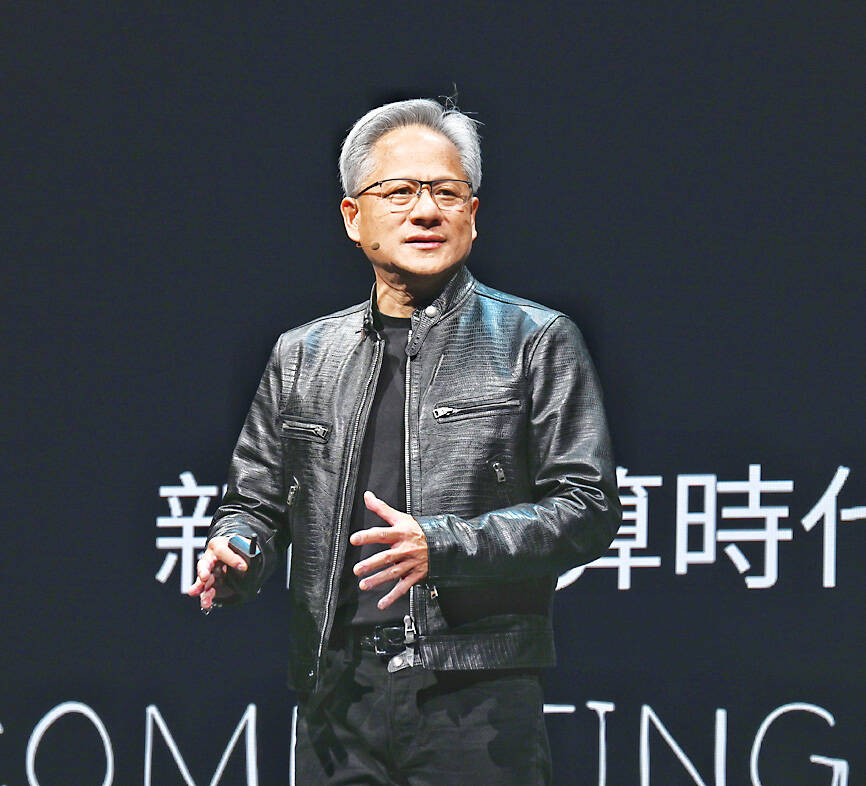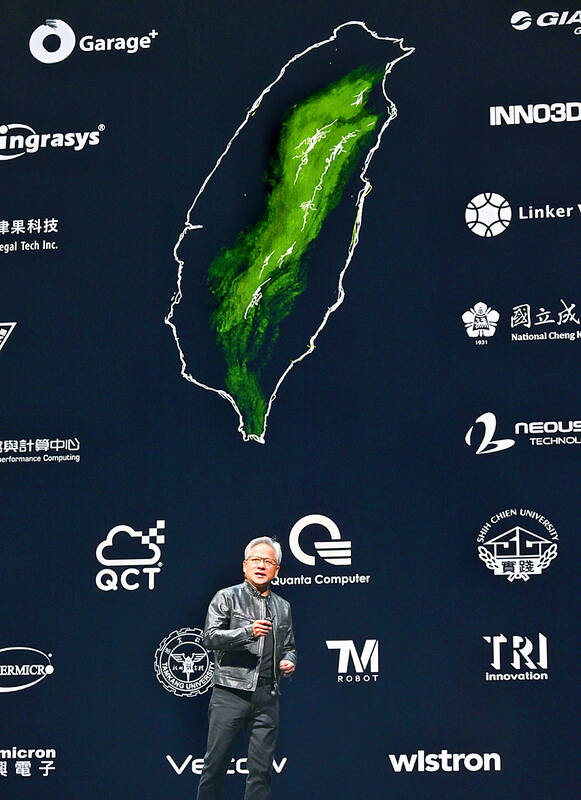The world’s biggest heavyweights in chipmaking and artificial intelligence (AI) are to converge this week for Taiwan’s premier tech expo, Computex Taipei, with Nvidia Corp CEO Jensen Huang (黃仁勳) yesterday receiving a rock-star reception during his speech ahead of the event.
Huang told an audience of tech industry leaders at National Taiwan University how the era of AI is driving a new industrial revolution across the globe, as the computer industry goes through a reset.
Two fundamental technologies, accelerated computing and AI, are the forces that “will reshape the computer industry,” he said.

Photo: Fang Pin-chao, Taipei Times
Huang showed a video narrated in Mandarin by an AI avatar that used a map of Taiwan to demonstrate how NVIDIA Earth-2, a generative AI model for weather and climate research, can predict climate change.
He also reiterated a comment he made at last year’s Computex, saying that graphics processing units (GPUs) would save companies money over using CPUs for the same tasks, adding that “the more GPUs you buy, the more you save.”
Huang said he was “very happy to be in Taiwan,” calling the country a gathering place for Nvidia’s partners, adding that everything started for the company in Taiwan.

Photo: Fang Pin-chao, Taipei Times
The speech was attended Taiwan Semiconductor Manufacturing Co (台積電) chief executive C.C. Wei (魏哲家), Hon Hai Precision Industry Co (鴻海精密) chairman Young Liu (劉揚偉), Quanta Computer Inc (廣達) founder and chairman Barry Lam (林百里), and Asustek Computer Inc (華碩) chairman Jonney Shih (施崇棠), among others.
There is outsized interest in this year’s Computex, thanks to the participation of not just Huang, but the leaders of some of Nvidia’s main rivals in AI hardware, including Advanced Micro Devices Inc (AMD), Qualcomm Inc and Intel Corp.
Computex is set to open tomorrow at the Taipei Nangang Exhibition Center. The event is the top annual tech showcase in Taiwan, whose advanced semiconductor industry is crucial to the production of everything from iPhones to the servers that run ChatGPT.
“This is the beginning of our company’s business because we build our wafers here and build our systems here,” Huang told reporters last week.
Huang, who was born in Tainan, has celebrity status in Taiwan, with feverish media attention and fans stopping him for autographs and selfies. His net worth briefly surpassed US$100 billion earlier last week after another blowout quarter from the chipmaker.
That is thanks in large part to Nvidia becoming the undisputed global leader in the specialized chips and hardware needed for cutting-edge AI.
AMD CEO Lisa Su (蘇姿丰), who was also born in Tainan, and Qualcomm CEO Cristiano Amon are also scheduled to deliver keynote speeches at Computex.
Su is expected to outline AMD’s plans to compete in cutting-edge AI, while Amon would “showcase the AI-accelerated experiences users can expect from their next-generation PCs,” the event’s organizers said.
Intel CEO Pat Gelsinger and Arm Holdings PLC CEO Rene Haas are also to speak at the event.
Tech firms are betting big on AI, and Taiwanese manufacturers are central to their plans, as the nation produces the bulk of the world’s most advanced semiconductors, including those needed for the most powerful AI applications and research.
Suppliers such as Hon Hai — also known internationally as Foxconn Technology Group (富士康科技集團) and traditionally focused on contract electronics for the likes of Apple Inc — have also pivoted in recent years into producing AI hardware.
Liu on Friday told shareholders that the firm’s global market share for AI servers would increase to 40 percent this year.

The CIA has a message for Chinese government officials worried about their place in Chinese President Xi Jinping’s (習近平) government: Come work with us. The agency released two Mandarin-language videos on social media on Thursday inviting disgruntled officials to contact the CIA. The recruitment videos posted on YouTube and X racked up more than 5 million views combined in their first day. The outreach comes as CIA Director John Ratcliffe has vowed to boost the agency’s use of intelligence from human sources and its focus on China, which has recently targeted US officials with its own espionage operations. The videos are “aimed at

STEADFAST FRIEND: The bills encourage increased Taiwan-US engagement and address China’s distortion of UN Resolution 2758 to isolate Taiwan internationally The Presidential Office yesterday thanked the US House of Representatives for unanimously passing two Taiwan-related bills highlighting its solid support for Taiwan’s democracy and global participation, and for deepening bilateral relations. One of the bills, the Taiwan Assurance Implementation Act, requires the US Department of State to periodically review its guidelines for engagement with Taiwan, and report to the US Congress on the guidelines and plans to lift self-imposed limitations on US-Taiwan engagement. The other bill is the Taiwan International Solidarity Act, which clarifies that UN Resolution 2758 does not address the issue of the representation of Taiwan or its people in

US Indo-Pacific Commander Admiral Samuel Paparo on Friday expressed concern over the rate at which China is diversifying its military exercises, the Financial Times (FT) reported on Saturday. “The rates of change on the depth and breadth of their exercises is the one non-linear effect that I’ve seen in the last year that wakes me up at night or keeps me up at night,” Paparo was quoted by FT as saying while attending the annual Sedona Forum at the McCain Institute in Arizona. Paparo also expressed concern over the speed with which China was expanding its military. While the US

SHIFT: Taiwan’s better-than-expected first-quarter GDP and signs of weakness in the US have driven global capital back to emerging markets, the central bank head said The central bank yesterday blamed market speculation for the steep rise in the local currency, and urged exporters and financial institutions to stay calm and stop panic sell-offs to avoid hurting their own profitability. The nation’s top monetary policymaker said that it would step in, if necessary, to maintain order and stability in the foreign exchange market. The remarks came as the NT dollar yesterday closed up NT$0.919 to NT$30.145 against the US dollar in Taipei trading, after rising as high as NT$29.59 in intraday trading. The local currency has surged 5.85 percent against the greenback over the past two sessions, central